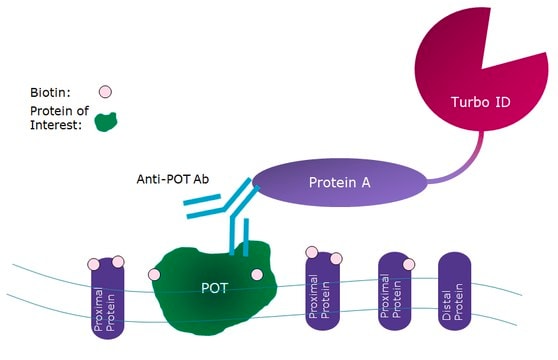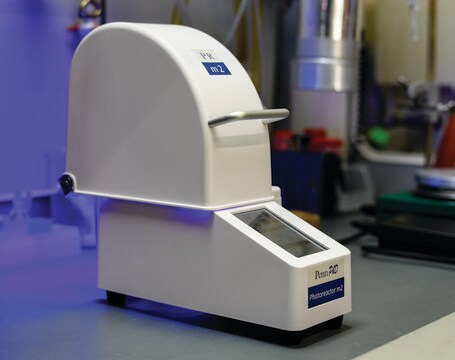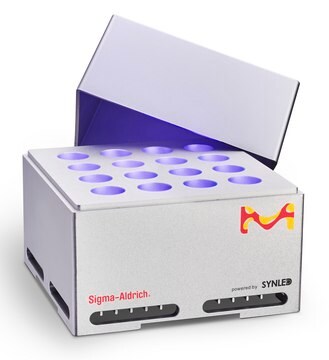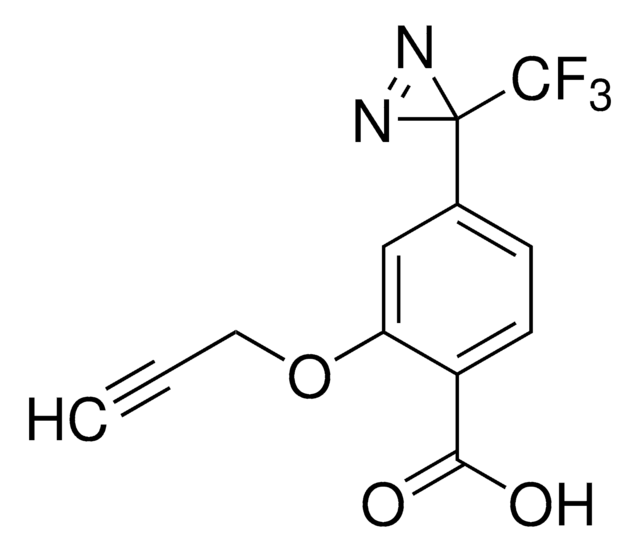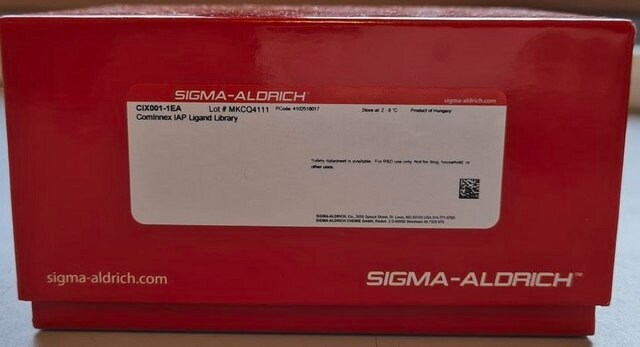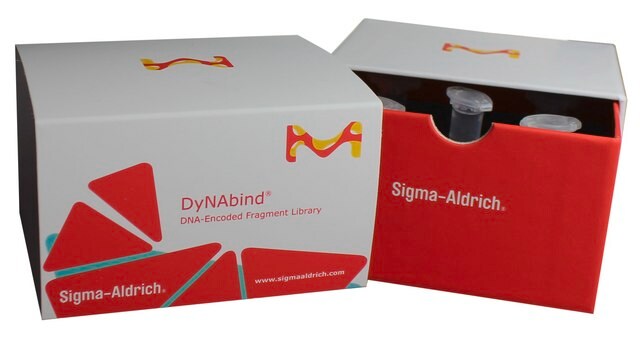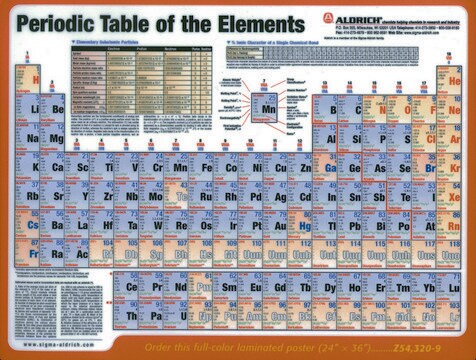Wszystkie zdjęcia(1)
Kluczowe dokumenty
ATLASKIT
AtlasKit
Synonim(y):
Antibody-photocatalyst conjugate labeling, Microenvironment mapping technology, Photoinduced proximity labeling kit, Protein-protein interaction elucidation technology
Zaloguj sięWyświetlanie cen organizacyjnych i kontraktowych
About This Item
Kod UNSPSC:
12161503
NACRES:
NA.22
Polecane produkty
temp. przechowywania
−20°C
Opis ogólny
Zestaw Atlas MicroMap to wysoce precyzyjna platforma do znakowania zbliżeniowego, służąca do wyjaśniania interakcji białko-białko na błonach komórkowych. Wykorzystując przeciwciało specyficzne dla celu białkowego, zestaw Atlas MicroMap sieciuje białka w promieniu 4 nm, aby zidentyfikować tylko te, które znajdują się w pobliżu celu zainteresowania. Zestaw zawiera niezbędne odczynniki do wykonywania fotoindukowanego znakowania zbliżeniowego przy użyciu systemu Atlas. Procedury zostały zaadoptowane z tych opublikowanych przez MacMillan Lab w Science. Dostępne są dwa rozmiary zestawów, zapewniające wystarczającą ilość koniugatu przeciwciała dla 10 reakcji (AtlasKit-A) lub 20 reakcji (AtlasKit-B).
Zestaw zapewnia krok po kroku procedurę koniugacji przeciwciała z fotokatalizatorem, który lokalizuje sieciowanie za pośrednictwem światła do docelowego przeciwciała i otaczających białek. Najpierw do przeciwciała dołączany jest łącznik zawierający azydek, który "klika" na fotokatalizator irydowy. Powstały koniugat przeciwciało-fotokatalizator jest dodawany do żywych komórek wraz z biotynylowanym odczynnikiem diazirynowym. Analogicznie do satelity, fotokatalizator lokalizuje wytwarzanie karbenu z diazyryny, a tym samym kowalencyjnie modyfikuje otaczające białka. Znacznik biotyny pozwala na wzbogacenie fotoznakowanych białek. Jak wykazano w badaniu Geri et al., zakres tego fotoindukowanego znakowania mieści się w promieniu 4 nm od fotokatalizatora, zapewniając zaawansowaną precyzję mapowania sieci interakcji białek.
Przeczytaj więcej o mikromapowaniu w naszym Technology Spotlight
Protokół dostępny tutaj
Dołączone:
Nie zawiera:
Fotoreaktory dostępne w handlu:
Zestaw zapewnia krok po kroku procedurę koniugacji przeciwciała z fotokatalizatorem, który lokalizuje sieciowanie za pośrednictwem światła do docelowego przeciwciała i otaczających białek. Najpierw do przeciwciała dołączany jest łącznik zawierający azydek, który "klika" na fotokatalizator irydowy. Powstały koniugat przeciwciało-fotokatalizator jest dodawany do żywych komórek wraz z biotynylowanym odczynnikiem diazirynowym. Analogicznie do satelity, fotokatalizator lokalizuje wytwarzanie karbenu z diazyryny, a tym samym kowalencyjnie modyfikuje otaczające białka. Znacznik biotyny pozwala na wzbogacenie fotoznakowanych białek. Jak wykazano w badaniu Geri et al., zakres tego fotoindukowanego znakowania mieści się w promieniu 4 nm od fotokatalizatora, zapewniając zaawansowaną precyzję mapowania sieci interakcji białek.
Przeczytaj więcej o mikromapowaniu w naszym Technology Spotlight
Protokół dostępny tutaj
Dołączone:
- Odczynniki i bufory do koniugacji, fotokatalizator, fotoaktywna diazyryna-biotyna, fluorescencyjny wzorzec do walidacji.
Nie zawiera:
- Przeciwciała (pierwotne, wtórne, izotypowe)
- Fotoreaktor naświetlający (sugestie poniżej)
- Test stężenia białka (zalecany test BCA)
- Czytnik płytek
- Kolumny do odsalania (7K MWCO, zalecane 2 mL)
Fotoreaktory dostępne w handlu:
Zastosowanie
Zbliżeniowe znakowanie białek, interakcje białko-białko, znakowanie metodą powinowactwa fotograficznego, proteomika
Działania biochem./fizjol.
Zestaw komponentów zapakowanych w pojedyncze fiolki, umożliwiający fotoindukowane znakowanie zbliżeniowe. Zestaw zawiera odczynniki do koniugacji przeciwciał, chemii kliknięć i fotoznakowania białek. Chemia jest kompatybilna z przeciwciałem specyficznym dla klienta (nie dostarczanym jako część zestawu) dla interesujących białek. Zestawy są dostępne dla 10 reakcji (AtlasKit-A) lub 20 reakcji (AtlasKit-B).
Ta strona może zawierać tekst przetłumaczony maszynowo.
Kod klasy składowania
10 - Combustible liquids
Wybierz jedną z najnowszych wersji:
Certyfikaty analizy (CoA)
Lot/Batch Number
It looks like we've run into a problem, but you can still download Certificates of Analysis from our Dokumenty section.
Proszę o kontakt, jeśli potrzebna jest pomoc Obsługa Klienta
Masz już ten produkt?
Dokumenty związane z niedawno zakupionymi produktami zostały zamieszczone w Bibliotece dokumentów.
Nasz zespół naukowców ma doświadczenie we wszystkich obszarach badań, w tym w naukach przyrodniczych, materiałoznawstwie, syntezie chemicznej, chromatografii, analityce i wielu innych dziedzinach.
Skontaktuj się z zespołem ds. pomocy technicznej